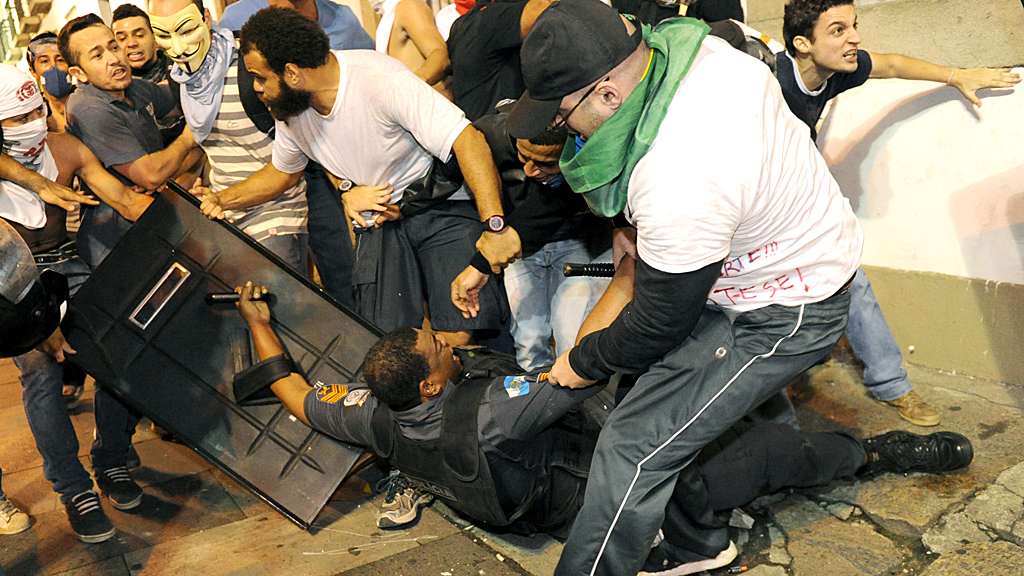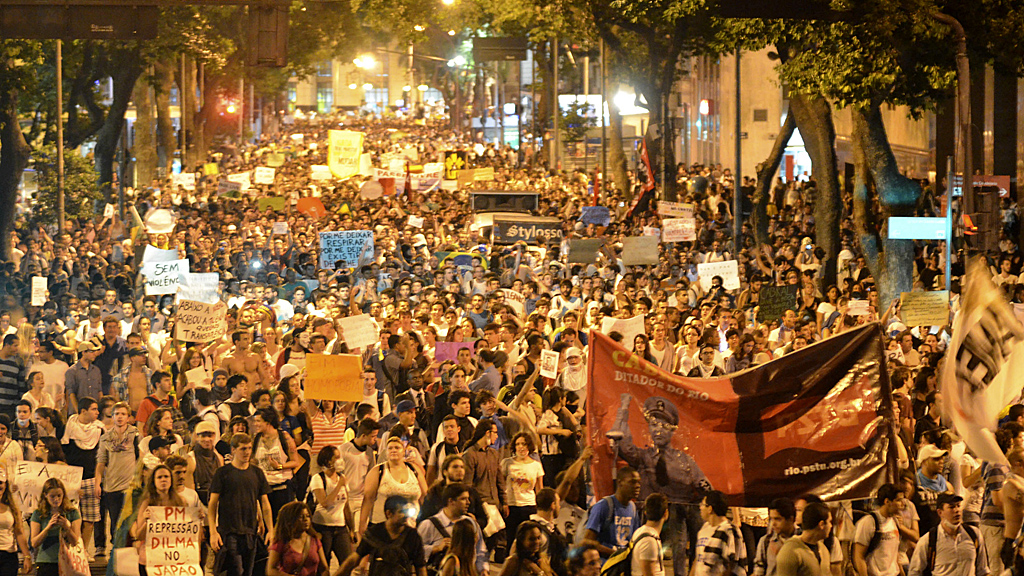Brazil hit by violent protests in eight cities
Violent clashes break out across Brazil as around 200,000 people take to the streets in protest over high taxes and poor public services.
In some of the largest protests since the end of the 1964-1985 dictatorship, protesters clashed with police in riot gear.
The marches, organised mostly through snowballing social media campaigns, blocked streets and halted traffic in eight cities including the capital Brasilia, Rio de Janeiro, Sao Paulo, Belo Horizonte and the southern city of Porto Alegre.
The epicentre of Monday’s march shifted from the economic hub of Sao Paulo, where at least 65,000 protesters descended in three different areas, to Rio – where the most violent scenes took place.
Around 50 protesters tried to break into Rio’s state assembly building, climbing on the roof and later storming the building.
The newspaper O Globo, citing the state security department, said 20 police officers and 10 protesters were injured in the city.

Kicking off
The spate of demonstrations was sparked by a 10-cent hike in bus and subway fares last week, which led to an outcry against poor public services, police violence and government corruption.
The protests come just one month before the Pope’s first foreign trip, to Rio, which is expected to attract 2 million visitors to the city.
They also coincide with Brazil’s hosting of the Confederations Cup, a dry run for next year’s World Cup, and come three years ahead of the 2016 Olympics in Rio de Janeiro.
The unrest has raised some security concerns, with further protests reportedly due in the coming days. It is unclear what specific response from authorities – such as a reduction in the hike of transport fares – would see the loose collection of organisers across Brazil end their rallies.
Many protesters are using the Confederations Cup to amplify their concerns, contrasting the billions in taxpayer money spent on new stadiums with the shoddy state of Brazil’s public services.
The tournament got off to shaky start over the weekend when police clashed with demonstrators outside stadiums at the opening matches in Brasilia and Rio.
Middle class revolt
Many of the protesters in Sao Paulo appeared to be middle class university students, carrying smartphones and high-end cameras. Some claimed to be inspried by the protests in Istanbul, chanting “Peace is over, Turkey is here!”. Others said they opposed transport fares, while there was a significant presence of left-wing political parties.
According to the World Bank, some economists have warned that the rapid growth of Brazil’s middle class could not be sustained at its current pace, and with its conditions of debt.
In the last decade Brazil’s middle class has grown by more than 40 per cent to 95m people in 2011 – just under half of the country’s 196m population, according to the World Bank.
Some 90 per cent of middle-class citizens, defined as those earning between $10 and $50 per day, live in urban areas, Brazil’s government figures show.

A rising consumer force, the middle classes have begun to demand more from the government.
A World Bank report in 2012 warned that the consumption boom posed a risk. “Brazillian middle-class households may be saving too little,” it said. “Families could become over indebted and vulnerable in the long term if Brazil’s economy slows down”.
Brazilians have long accepted corruption as a cost of doing business, whether in private or public services.
But many protesters are angry that billions of dollars in public funds are being spent to host the 2014 World Cup and 2016 Olympics while few improvements are made elsewhere.
Graciela Catador, a 28-year-old saleswoman protesting in Sao Paulo, said: “For many years the government has been feeding corruption. People are demonstrating against the system. They spent billions of dollars building stadiums and nothing on education and health.”
The Brazilian government loses more than $47bn each year to undeclared tax revenue, vanished public money and other widespread corruption, according to the Federation of Industries of Sao Paulo business group.




